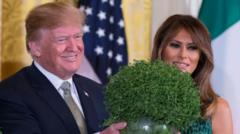As St. Patrick's Day approaches, a long-standing tradition brings political leaders from Northern Ireland and the Republic of Ireland to Washington D.C. for a series of events aimed at fostering relationships with U.S. lawmakers and business magnates. While many emphasize the diplomatic and economic importance of these visits, others raise concerns amid Donald Trump's controversial policies.
The annual congregation draws various representatives, including politicians, business executives, and lobbyists, who hope to promote investment and trade relations. Several Northern Ireland politicians this year have opted to abstain from visiting Washington, citing Trump's policies as a reason to distance themselves from the administration.
Steve Aiken, who served as the chief executive of the British-Irish Chamber of Commerce and the leader of the Ulster Unionist Party, believes that face-to-face interactions in Washington are crucial for cultivating political and economic ties. “Engagement in person surpasses virtual meetings, especially concerning complex political dialogues,” he stated.
Former Sinn Féin member Máirtín Ó Muilleoir echoed these sentiments, noting that the ambiance in the U.S. surrounding St. Patrick's Day creates an eagerness for companies to work with Irish politicians. He recalls fruitful past interactions at the White House, where investments and financial announcements were often made. "The climate of St. Patrick's Day promotions in the U.S. markets helps draw attention to our initiatives,” said Ó Muilleoir.
The unique gesture of presenting the U.S. president with a bowl of shamrock has a historical context rooted in improving relations post-World War II, a tradition now viewed as an emblematic link between Ireland and the U.S. Each year, the Irish Taoiseach’s visit symbolizes the diplomatic connection between the two nations.
However, while the visits are a platform for showcasing collaboration between Ireland and the U.S., the tangible impacts are hard to measure. An economist from Ulster University cautioned against assuming a direct relationship between these visits and subsequent investments, suggesting that broader economic fundamentals often play a more significant role.
With the political landscape shifting and fewer Irish Americans occupying prominent positions in U.S. politics today, leaders are aware of the increasing difficulty in maintaining visibility. Despite their reduced influence, Ó Muilleoir believes that Irish representation remains strong in the capital, citing the visible Irish presence in New York City.
As political factions navigate their participation in this year’s events, the decision reflects broader sentiments within Ireland regarding U.S. policies. Some parties, including Sinn Féin and the Social Democratic and Labour Party, have opted out of attending due to disagreements with the current administration’s approach on various global issues, including the Israel-Gaza conflict.
Nonetheless, for leaders who choose to attend, such as the Democratic Unionist Party's Emma Little-Pengelly, there’s a belief in the necessity of keeping avenues open for interaction. “Having dialogue and maintaining relationships amidst controversy is paramount,” she commented, acknowledging the complexities tied to such events.
As this year's festivities approach, the balancing act of diplomacy, amid contentious political climates, remains a poignant challenge for Ireland’s representatives navigating a path in Washington.





















